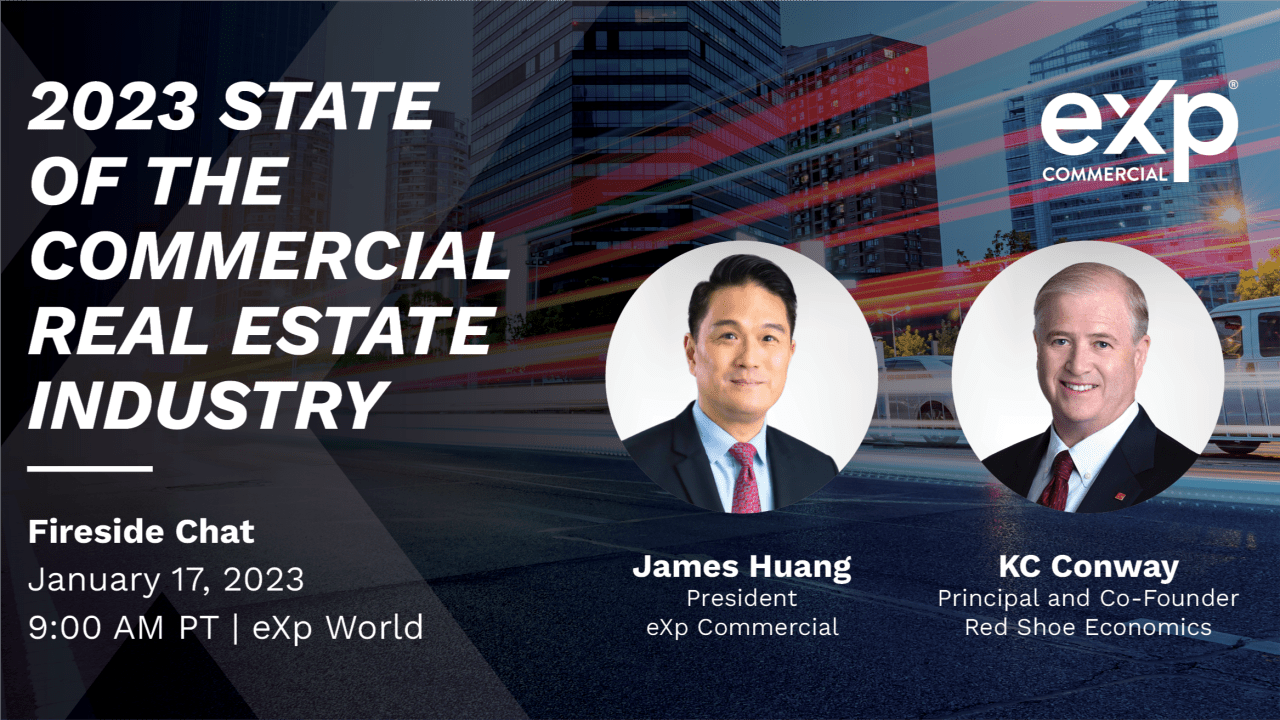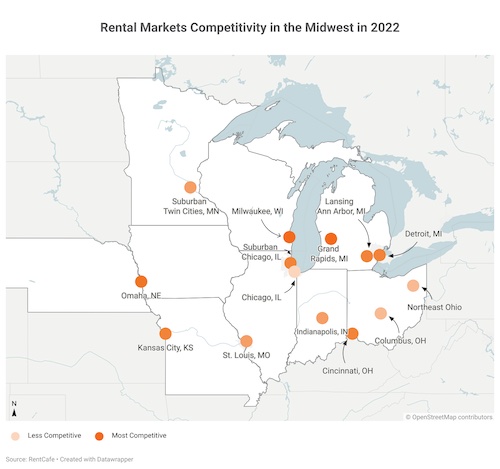
Interested in Joining eXp Commercial as a Commercial Real Estate Agent?
Further Info
https://www.creconsult.net/market-trends/2023-exp-commercial-commercial-real-estate-symposium/
eXp Commercial is one of the fastest-growing national commercial real estate brokerage firms. The Chicago Multifamily Brokerage Division focuses on listing and selling multifamily properties throughout the Chicago Area and Suburbs.

The Commercial Real Estate Symposium will provide junior and senior agents and brokers with valuable insights on topics, including: international opportunities, capital and funding for small businesses in today’s market, how to attract investors, and much more.
Dates: April 25-26, 2023
Start Time: 9 a.m. - 4 p.m. CST
Location: eXp Commercial Campus
We look forward to seeing you in the metaverse!
Important: Please download the virtual eXp Commercial Campus prior to the event, and follow the instructions to login and create your avatar. Feel free to explore the campus before the event begins.

Property improvements and upgrades can be expensive. And, it is easy to over-improve. I’ve been guilty of it several times. But, over the years, I’ve learned a few key practices and thought processes to maximize the return on your property upgrades and to help you select the improvements that will become a profit center and not just a cost. With that in mind, here are a few things to consider…
Know Your Market. A word of caution, before you start, you need to do your homework. The location of your property, the people working in the area, and the nearby amenities will all help determine what the right features should be for your property. You don’t want to waste your money on amenities that don’t add value to your tenant demographic or that won’t get used.
Not everyone wants or needs a dog walking area or a bike room. Survey your current residents for what upgrades they want – or, if you think you will be changing your tenant profile, determine your target demographic, and look to what the newer properties are offering to that market. You might be surprised at what features and amenities are priorities to your target market.
Go For a ‘Wow’ Feature. Make your property stand out. One of the first goals in adding value is to differentiate your property. Your goal is to create something at your property that the prospect wants, but that they can’t get anywhere else – at least not in your price range. This might mean, for example, creating a large, walk-in closet, complete with a high end closet organizing system versus the other properties that just have a standard closet. If you’re renovating your unit, think about how you can steal space for this. Most units these days are lacking in storage space.
It could be a unique common area amenity like a great BBQ or pool area. It could be unique services that you offer. Even doing a two color paint job vs. one color in the units can make a difference. Maybe your future residents get to choose from a palette of colors. Whatever it is, the key is to make your property stand out in the mind of the prospect.
If nothing else, I try to add a few features in the apartment that are ‘one step up’ from what the prospect might expect in comparable priced units. This might mean a nicer appliance, or electrical outlets with USB ports. The key is to be different and better in the mind of the prospect.
Think upgrades that have Operational Benefits. Think improvements like using LED lighting to save on energy bills, or adding a camera system that not only makes residents feel secure, but helps eliminate some of the problems you’ve had at your property. Perhaps upgrading the bath vent fans in the units to ones that are quieter and have stronger air flow. This not only make your tenants happier (to not have that noisy vent fan), but reduces the chance of mold developing. The list goes on and on.
Energy savings is a great area to look at. Smart lighting systems or thermostats not only save money and energy, but also have a ‘cool’ factor (pun intended). How nice would it be for your resident to be able to turn on their air conditioning 30 minutes before getting home. Or, with a smart lock, to be able to let in their guest, even when running late.
I once rented an office at a co-working space. The hallway lighting was motion activated, and monitored what times people tended to be in the offices and when they left. This helped keep the hours that the heat and air conditioning were on to a minimum, while still keeping us, as tenants, comfortable. You can do something similar at your property.
Think Amenities that Bring People Together. Renters today are looking for a sense of community. You want that too – encouraging connection amongst your residents keeps them happier and keeps them longer. That means less turnover for you and a building that becomes more in demand as residents encourage their friends to move to your property as well.
People spend so much time on technology these days, that they are looking for more human interaction in their community. Providing an amenity that aids in the meeting of fellow residents is the type of thing renters are looking for in their living experience.
You might have unused or underutilized outdoor space that could be converted into an area for social gatherings. Common cooking spaces, dog parks, community gardens, or rooftop decks and coffee bars are all places residents can gather to get to know each other. Creating great community amenities that encourage mingling and socializing is a great use of your renovation dollar.
When planning your renovations, always select your projects with intention. When it comes to attracting and keeping quality residents, the amenities and upgrades you choose make a big difference. Residents today are looking for amenities that provide convenience and a sense of community. Your goal is to meet those needs and do what you can to keep them longer. Remember, reducing turnover makes you money in the long run.
A word of caution - Always keep the base level of your competition and the reputation of the neighborhood in mind. People will only look in a certain price range in any given neighborhood. Above that, they go to the ‘next best’ neighborhood to look. I wish you great success in your next renovation.
Source: How to Upgrade Your Property but not Over Improve it

Using Data to Drive NOI
Real-time data helps multifamily leaders make better decisions, faster; ultimately being the key to driving NOI. We’re big proponents of using data to show your people what to do next versus telling them what to do. It’s a crucial practice to driving sustained organizational revenue and winning as a team in an industry that lags others in terms of innovative practices.
Here are three actionable use cases that our team presented at the RETCON 2022 Conference to illustrate the NOI power of showing versus telling.
A multifamily client (Asset Manager) was faced with a New York property that was falling short of its occupancy goals despite a relatively high-cost unit marketing spend.
Instead of immediately increasing their marketing spend, they dug into the data and found:
Here’s where the rubber meets the road. Conversion after touring was less than half of other NYC projects. This revealed a few great opportunities:
While it may seem counter-intuitive to reduce Marketing spend while trying to drive more traffic, using the data to play out what-if scenarios (traffic conversion to application, optimizing traffic sources, etc.) allowed the client to focus on key areas to drive efficiency and effectiveness.
Visualization Case - Show Trends
In the first month of a lease-up, another multifamily client (Owner Operator) was reviewing the leasing velocity data of their high-rise development. They started their conversation with a look at the occupancy and availability through their elevation visualization.
This allowed them to visualize current data using 2D, 3D, and geospatial models of their lease-up. Seeing some floorplans/stacks lease more quickly and others more slowly, they found there was something geographically appealing about a particular side of the property.
This revealed a big opportunity:
Data visualization allowed the team to quickly spot this unusual trend and gain clarity around unit-specific nuances that were impacting leasing and NOI.
Renewal Case – Show Variables
We’ve all heard the age-old saying that it costs more to hire a new employee than it does to retain one. Well, the same goes for multifamily, thus the importance of effectively managing renewals, which often make up 50% or more of a property’s NOI.
A multifamily client (Owner Operator) built an analytically driven culture and NOI within their organization by deploying a Renewal Negotiation Dashboard that co-mingles data from different sources so that Community Managers could see all the variables that might play into a resident’s decision to renew their lease or not.
The following data provided all the answers to questions that a resident might raise during a renewal discussion and empowered managers to know the entire lease story for any resident who walked through the door within minutes.
By making this data available, Community Managers across the organization were empowered to gauge when they were in a position of strength to negotiate or weakness.
These are only a few examples of wins that have come out of using data to show versus tell. What could your data be showing you? How could you be using data to lead your teams to faster and better decisions? Is your data hindering or driving your NOI?
Source: Show Don’t Tell – Using Data to Drive NOI

Join eXp Commercial President James Huang and Economist KC Conway on January 17 for a fireside chat as they discuss the state of the 2023 economy and how you can prepare your business for success in the changing market.
Date: January 17, 2023
Time: 11 a.m. - 1 p.m CST
Location: eXp World > eXp Commercial Auditorium

Multifamily brokers frequently hear this comment from apartment property owners: “I don’t want to list, but you can bring me a buyer.” Their reasons sometimes include previous bad experiences, fear of getting “tied up” in a formal agreement, tenants finding out the building is for sale and making anxious calls to management, thinking the commission will be halved, or not really being interested in selling. Whatever the reluctance, the reality is that if an investor wants or needs to sell, the best thing they can do is hire a broker. Let’s address a few of those common objections first.
If you had a previous bad experience, more than likely, you hired the wrong broker. The specific agent you hire or the firm they work for should have experience in both the geographic market and transaction size — ask for their track record. While you’re at it, ask for references from clients, and make sure at least one is for a listing that did not sell. These simple steps will give you insight into whether you’re working with a pro.
As for getting “tied up” or having anxious tenants because the building is selling, a professional broker typically allows you a cancellation right for the listing. If there are deadlines you need to meet, make sure your broker understands. And while no broker can guarantee tenants won’t find out the building is being sold, experienced brokers can modify marketing by limiting showings to only vacant units, specific hours for low visibility, limiting digital footprint tenants might see, etc., to reduce the probability of tenants finding out.
That said, the best course is simply to announce to tenants that the building has been listed for sale, explain the sale may not be successful, and assure them that their lease runs with the building, not the owner, and is their protection during the lease term against rent increases or being forced to move.
These are certainly not the only reasons clients are reluctant to list but whatever is yours, talk to your broker about your real concerns. A seasoned broker will most likely have previously faced a similar challenge and should be able to address your concern. But this only addresses your concerns about why you shouldn't hire a broker — it doesn’t explain why you should.
The first benefit is understanding the value of your property. A professional, qualified broker who specializes in your asset or area will be able to give you a price range to expect so that you can decide whether selling makes sense. If you move forward, this specialist will also have databases of the most qualified, active investors in the market and have relationships and influence with them. The ultimate buyer of your property will more than likely come from one of these relationships. But a broker won’t rely exclusively on these relationships. A good broker will also create a professional marketing plan with appropriate amounts of promotion across email, mail, websites, and listing services.
All this leads to the most important part of hiring a broker: competition. Trying to sell your building by letting a broker “bring you a buyer” is like having an auction for a painting, and one person shows up to bid. If the building is priced correctly, a professional marketing plan will create a competitive environment for investors so that the process itself determines not what the market wants to bid but what the market is willing to bid.
Larger portfolio owners might be reluctant to list with a specific broker because they have relationships with numerous brokers or firms in the market, and they don’t want to offend anyone by choosing a competitor. Instead, they tell every relationship to “bring me a buyer.” If this is you, think a few more steps down the chain of events.
First, this may only create chaos. You not only have brokers racing each other to bring clients, but each is advocating to you why their buyer is the best so that they can get the commission. Then you ultimately have to pick one buyer/broker anyway and disappoint the others after they’ve put work in. Alternatively, a listing agreement assures a commission for the listing agent if the property sells; therefore, there is no incentive to advocate for any one specific buyer.
An additional benefit of listing a property with a broker comes after a sale contract is signed. Any number of unexpected or challenging issues can arise during the escrow period of a sale. A seasoned broker has probably experienced something similar before. This person will also quarterback the entire process of due diligence, appraisal, and loan approval.
The most important benefit of exclusively listing your property with a broker is representation. You will have a hired gun with a fiduciary obligation to advocate for your best position in a deal. A professional broker will be ethical, transparent, and fair but will also be your personal fighter in the arena of marketing, negotiation, and escrow management.
This short list does not address every objection an owner would have for not listing, nor every benefit you receive from hiring a professional broker, but hopefully, it gives you a few things to consider. If you want to maximize your price and minimize your anxiety with the selling process, hire a broker. The benefits far outweigh the cost.
eXp Commercial Chicago Multifamily Brokerage focuses on listing and selling multifamily properties throughout the Chicago Area and Suburbs.
We don’t just market properties; we make a market for each property we represent. Each offering is thoroughly underwritten, aggressively priced, and accompanied by loan quotes to expedite the sales process. We leverage our broad national marketing platform syndicating to the top CRE Listing Sites for maximum exposure combined with an orchestrated competitive bidding process that yields higher sales prices for your property.

As the year ends, renting is at its highest level in half a century. The increased adoption of “work from home” provided many people the freedom to experience life in a new location.
What were the hottest rental markets in 2022? RentCafe.com analyzed the largest markets in the U.S. where data was available by honing in on (1) the number of days apartments were vacant, (2) what percentage of rentals were occupied, (3) the number of prospective renters competing for an apartment, (4) what percentage of renters renewed their leases and (5) the share of apartments completed this year.
Vacant units, nationwide, were occupied within a month, on average, and a heightened number of renters chose to renew their leases. Rapid inflation and surging interest rates forced many people to put their dreams of homeownership on the backburner, but with 95% of apartments already occupied, finding a new unit in any market was competitive, to say the least.
Renters in search of a lower cost of living flocked to the Midwest. Milwaukee, Wisconsin, and Grand Rapids, Michigan, were among the most competitive metros this year, based on the report, the latter boasting a city occupancy rate to nearly 97%. The shortage of supply there only increased demand, with 18 prospective renters in competition for each apartment. Milwaukee, too, had an average of 18 renters vying for a single unit, taking each off the market in less than a month.
Suburban Chicago ended the year as the country’s 18th most competitive rental market, according to RentCafe. Nearly 70% of renters here decided to stay put and renew their leases, further driving competition—close to 17 renters applied for each available unit, a number well-above the national average. With occupancy rates touching 96%, the metro was far from meeting the aggressive demand for housing, despite the increase in newly delivered units.
Surprisingly, Chicago Urban didn’t make the cut on this list. Good or bad news, depending on who it’s being considered by. The rate of renewal leases here reached 56.5%, and an average of 11 renters competed for each vacant apartment.

Source: Midwest home to most competitive rental markets in U.S. for 2022

Complacency is the most dangerous state to ignore.
It’s the moment before the market corrects and values decline. When the market goes through this initial correction, our natural tendency is to be complacent because initial corrections actually look like a cool-off period.
Then we expect the market to pick up again and continue with its growth phase.
But, the market continues to deteriorate and worries creep in as we wonder what is going on. Next, it is normal to say to yourself that your investments are good ones that they’ll ultimately come back.
When the market continues to soften until it seems there is no hope in coming back, that’s the absolute bottom of the market and the worst time to sell.
This point of capitulation is one of surrender and of asking how the government could let something like this happen.
In order to avoid loss, people will overvalue what they own.
That is what Richard Taylor, Daniel Kahneman, and Jack L. Knetsch identified with the Endowment Effect. In fact, Kahneman and Knetsch won the Nobel Peace Prize for their research in this area of behavioral economics.
In a study with Cornell undergrads, broken into groups and given identical coffee cups, Kahneman and Knetsch told one group to value the cups they owned and the other group to value the cups they would purchase.
They found the undergrads with the coffee cups were unwilling to sell their coffee cups for less than $5.25 while their less fortunate peers were unwilling to pay more than $2.25 to $2.75.
But, it was Carey Morewedge’s research into the Endowment Effect that revealed that it’s not loss aversion that leads to overvaluation, it’s ownership and identity.
Morewedge found that it’s our sense of possession that creates the feeling of an object being mine, which then becomes a part of our identity.
Why is it so difficult to sell commercial property in a market decline?
According to Brafman and Brafman, authors of Sway: The Irresistible Pull of Irrational Behavior people will go to great lengths to avoid perceived losses.
What’s more, people also succumb to their will to recover what once was. They will spend whatever it takes not to lose, be it time, money, or emotional resources.
Imagine watching someone playing craps in Las Vegas. When they are on a roll, taking in their winnings, they race through the growth phase, reaching the peak of the game.
They feel ecstatic.
But what happens when the tide turns and they start to lose?
They enter the complacency stage, call it a short turn of bad luck, and keep playing. They believe they will return to the top. But their bad luck continues.
They lose their winnings, keep playing and generate losses. They would rather hold onto the idea of getting back to where they were at almost any cost than realizing their loss and moving on to another opportunity.
People will self educate online because it is free and immediately available. A review of the search term on Google for “commercial real estate trends” returned 152 million results. A search for “commercial real estate trends YouTube” turned up 310 million results!
No doubt, an abundance of free information in the form of market data, blogs, market reports, and online opinions on what’s happening in the market is available.
When we aren’t sure what to do, we often consult friends, family, and non-commercial real estate advisors for input. Unfortunately, these people will not want to be the ones to say sell because it is easier to say no and risk being wrong than to say yes and risk not being right.
Plus, most of these folks will not have the data that you have seen here. These people are more likely to share anecdote based advice like “My friend made a killing in real estate. You should hold on, it will come back.” Remember, people who made this mistake lost in 2008-2010.
It is easy to find a traditional broker, given that 1 in 164 people in the United States today have a real estate license. According to the National Association of Realtors, there are about 2 million active real estate licensees in the United States.
The problem is that most traditional brokers do not specialize in Commercial Real Estate, Investment Sales and further specialization by property type.
eXp Commercial Chicago Multifamily Brokerage focuses on listing and selling multifamily properties throughout the Chicago Area and Suburbs.
We don’t just market properties; we make a market for each property we represent. Each offering is thoroughly underwritten, aggressively priced, and accompanied by loan quotes to expedite the sales process. We leverage our broad national marketing platform syndicating to the top CRE Listing Sites for maximum exposure combined with an orchestrated competitive bidding process that yields higher sales prices for your property.
eXp Commercial Presents: The 2026 CRE Economic Outlook Navigating the 2026 commercial real estate landscape requires a strategy grounded in ...